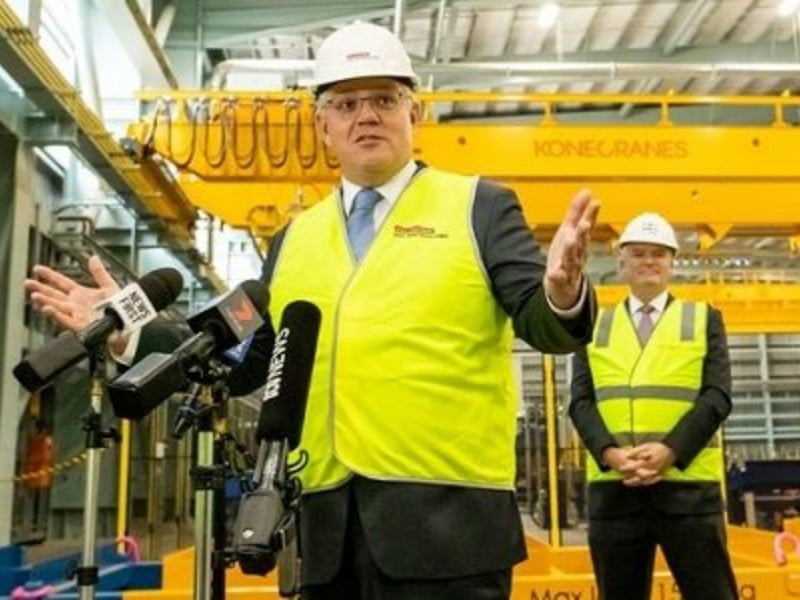Prime Minister Scott Morrison has unveiled plans to expand the defence force by 30 per cent with a specific focus on cyber positions, while Opposition Leader Anthony Albanese has also pledged to increase defence spending and will prioritise cybersecurity with a dedicated minister.
Both major parties made significant statements centred on Defence and national security on Thursday morning, as the khaki election ramps up.
The Coalition announced plans to expand the Australian Defence Force by 18,500 people, with a focus on cyber personnel and new submarine capabilities.

In a speech to the Lowy Institute, Mr Albanese positioned cybersecurity as a core national security issue, and said better political leadership is needed to ensure an uplift across the broader community.
In Queensland, Mr Morrison made the pledge to boost the ADF to a total workforce of 101,000 people by 2040, at a cost of $38 billion. This represents a 30 per cent increase to Australia’s defence force.
This will focus on new high-tech capabilities including cyber, intelligence, communications and information warfare operators.
“We need a bigger ADF with more soldiers and airmen and women to operate the cutting-edge capabilities we’re getting to protect Australia. You can’t flick a switch to increase your army, navy and air force overnight,” Mr Morrison told the media.
“Growing the type of people and skills we need to face the threats of the future takes time, so we must start now so critical skills can be taught and experience gained.”
Just hours later, Mr Albanese gave a wide-ranging speech laying out Labor’s approach to defence and national security if it is to win the upcoming federal election.
More needs to be done to improve the cybersecurity of Australian businesses of all sizes and individuals, the Opposition leader said.
“Technology has fundamentally, irreversibly changed the way we work, the way we communicate, the way we shop and bank and learn. As a consequence, cyber attacks represent a threat to our way of life,” Mr Albanese said in the speech.
“Australia has already been the target of state-sponsored cyber attacks, aimed at political parties, government departments, universities and corporations. Our security agencies are very good at what they do in this space, but true national cyber resilience is a whole-of-nation endeavour. It’s not just about who has the best offensive cyber tools, it’s about building systemic resilience across public, private and civil organisations.”
There has not been a federal cybersecurity minister for several years. Mr Albanese pointed to this lack of leadership and said a specific minister is needed for the crucial role.
“Lifting cyber resilience across the nation, across public, private and civil systems requires political leadership. Cybersecurity needs to be someone’s day’s job, not the last item on another Minister’s to do list,” he said.
Cybersecurity issues are currently covered by Home Affairs Minister Karen Andrews.
Mr Albanese aimed to largely position national security and defence as a bipartisan issue, with little difference between the Opposition and government.
He did however warn of a “looming submarine-shaped capability gap” due to the long timeframe for the delivery of Australia’s new nuclear-powered submarines.
Mr Albanese slammed the scrapping of the previous submarines program for the new nuclear plan, labelling it the “greatest defence procurement disaster we have seen in this country”.
He also pointed to other Defence procurement issues, saying that there are 30 major defence projects that are running 79 years late in total, with 17 major projects running $4.3 billion over budget.
“It will be incumbent on us to deliver a frank assessment of our capabilities and pipeline on arrival in government. Labor will plan for how we address submarine capability in the period until we receive the nuclear-powered submarines,” Mr Albanese said.
The Opposition Leader also questioned the timing of the government revealing the shortlisted three potential sites for a new submarine port on the east coast.
“The Morrison government has been dropping hints about submarines, but offered no clarity. This week we saw an announcement about an announcement, with the government promising that it would announce the location of a new submarine base in Australia in 2023,” he said.
“No doubt this is driven by an election timetable rather than a full analysis of our overall force posture which has not been done since Labor was last in power.”
Mr Albanese said the planned Defence Force Posture Review will provide Labor with a “more reliable basis” for the decision on the submarine base.
Do you know more? Contact James Riley via Email.

